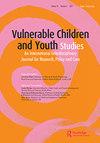COVID-19大流行后年轻人的心理困扰及其与体重变化的相关性
IF 0.7
Q4 FAMILY STUDIES
引用次数: 2
摘要
摘要本研究旨在调查马来西亚年轻人在疫情导致的封锁后的心理困扰与体重变化之间的相关性。年轻人自我报告了社会人口统计、身高、运动控制令3.0(MCO 3.0)期间的体重和封锁后的体重(截至2022年1月)。使用经验证的21项抑郁、焦虑和压力量表(DAS-21)评估心理困扰。在536名年轻人中,54.1%的人经历了轻度至极度严重的焦虑,47.0%的人遭受了轻度至极其严重的抑郁,30.0%的人在封锁后的疫情阶段经历了轻度到极度严重的压力。就绝对体重变化而言,50.6%的年轻人因禁闭而体重增加,平均体重增加3.41±2.49公斤。相反,32.0%的年轻人在MCO 3.0期间的体重比以前轻,平均体重减轻3.96±2.76公斤。此外,体重的轨迹也用相对体重变化来表示。研究结果显示,23.1%的年轻人在疫情封锁后阶段体重增加,平均相对体重增加9.04±3.90%。相反,约五分之一(17.4%)的年轻人体重减轻,平均相对重量减轻−8.57±2.79%,以及绝对或相对体重变化的压力,即使在控制了年轻人的社会人口统计学差异后也是如此。马来西亚联邦政府应采取必要行动,缓解新冠肺炎疫情对心理的影响,并重申年轻人保持健康体重的重要性。本文章由计算机程序翻译,如有差异,请以英文原文为准。
Psychological distress and its correlation with weight change in young adults in the aftermath of the COVID-19 pandemic
ABSTRACT This study aims to investigate the correlation between psychological distress and weight change in Malaysian young adults after the pandemic-led lockdowns. Socio-demographics, body height, body weight during the Movement Control Order 3.0 (MCO 3.0), and post-lockdown body weight (as of January 2022) were self-reported by the young adults. Psychological distress was assessed using a validated 21-item Depression, Anxiety, and Stress Scale (DASS-21). Of the 536 young adults, 54.1% experienced mild to extremely severe anxiety, 47.0% suffered mild to extremely severe depression, and 30.0% experienced mild to extremely severe stress in the post-lockdown pandemic phase. In reference to absolute weight change, 50.6% of the young adults gained weight due to confinement, with an average weight gain of 3.41 ± 2.49 kg. Conversely, 32.0% of the young adults had a lighter weight during the MCO 3.0 than before, with an average weight loss of 3.96 ± 2.76 kg. Additionally, the trajectory in body weight was also expressed in relative weight change. Findings revealed that 23.1% of the young adults gained weight in the post-lockdown pandemic phase, with an average relative weight gain of 9.04 ± 3.90%. On the contrary, approximately one-fifth (17.4%) of the young adults lost weight, with an average relative weight loss of −8.57 ± 2.79%. There were no significant correlations (p> 0.05) between depression, anxiety, and stress with absolute or relative weight change, even after controlling for the socio-demographic variation among young adults. The federal government of Malaysia should take necessary actions to alleviate the psychological impact of the COVID-19 pandemic and reiterate the importance of sustaining a healthy body weight in young adults.
求助全文
通过发布文献求助,成功后即可免费获取论文全文。
去求助
来源期刊

Vulnerable Children and Youth Studies
FAMILY STUDIES-
CiteScore
1.90
自引率
0.00%
发文量
33
期刊介绍:
Vulnerable Children and Youth Studies is an essential peer-reviewed journal analyzing psychological, sociological, health, gender, cultural, economic, and educational aspects of children and adolescents in developed and developing countries. This international publication forum provides a much-needed interdisciplinary focus on vulnerable children and youth at risk, specifically in relation to health and welfare issues, such as mental health, illness (including HIV/AIDS), disability, abuse, neglect, institutionalization, poverty, orphanhood, exploitation, war, famine, and disaster.
 求助内容:
求助内容: 应助结果提醒方式:
应助结果提醒方式:


